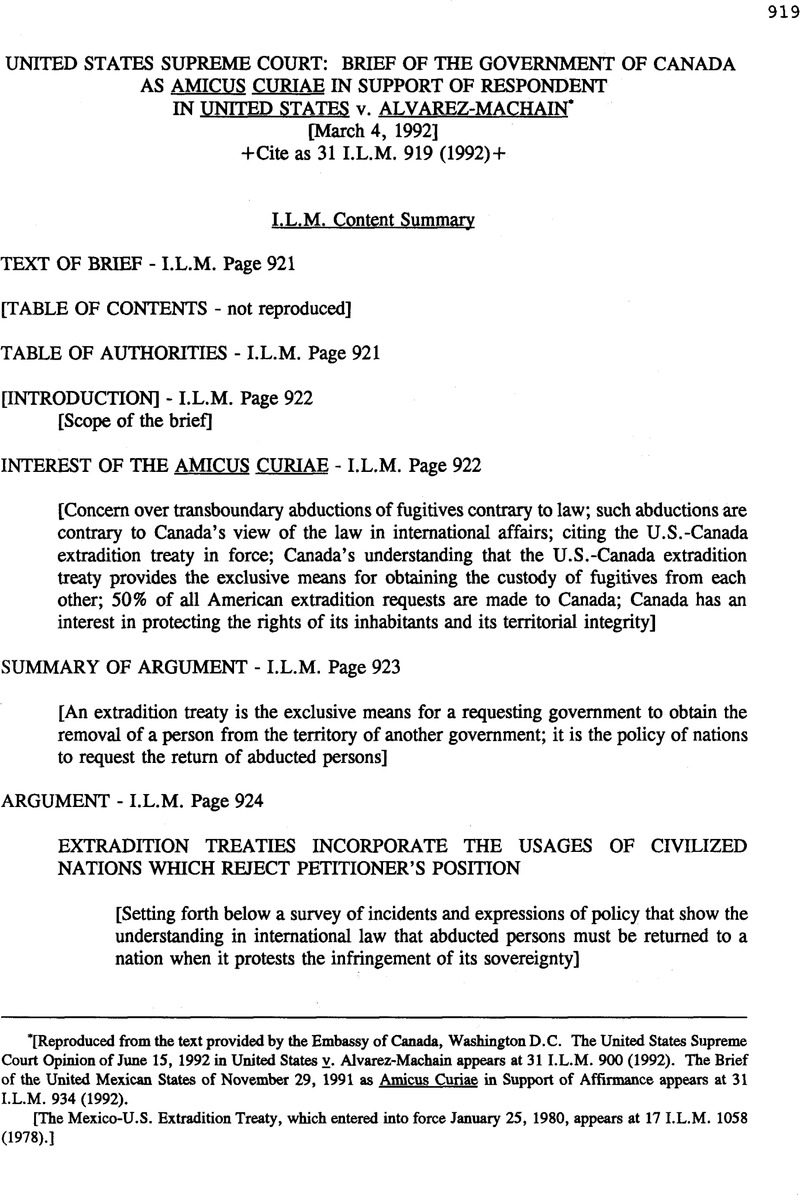No CrossRef data available.
Article contents
United States Supreme Court: Brief of the Government of Canada as Amicus Curiae in Support of Respondent in United States v. Alvarez-Machain*
Published online by Cambridge University Press: 18 May 2017
Abstract

- Type
- Judicial and Similar Proceedings
- Information
- Copyright
- Copyright © American Society of International Law 1992
Footnotes
[Reproduced from the text provided by the Embassy of Canada, Washington D.C. The United States Supreme Court Opinion of June 15, 1992 in United States v. Alvarez-Machain appears at 31 I.L.M. 900 (1992). The Brief of the United Mexican States of November 29, 1991 as Amicus Curiae in Support of Affirmance appears at 31 I.L.M. 934 (1992).
[The Mexico-U.S. Extradition Treaty, which entered into force January 25, 1980, appears at 17 I.L.M. 1058 (1978).]
References
1 According to newspaper reports, the United States’ view generally coincided until recently with that of Canada. See Michael Isikoff, U.S. “Power” on Abductions Detailed, The Washington Post p. A14 (August 14, 1991), contrasting views expressed by the U.S. Department of Justice's Office of Legal Counsel in'written opinions prepared in 1980 and in 1989 by then Assistant Attorneys General John M. Harmon and William P. Barr, respectively. See Symposium, 24 Cornell Int'l L.J. 52 (1991) (analyzing the two opinions in detail).
2 Petitioner's reliance on earlier British cases, e.g., Pet. Br.14 n.9, and 30 n. 25, must be assessed in light of Ex parte Mackeson. While it is true that British courts follow the reasoning that presence of an accused confers jurisdiction, even though there was a transborder abduction, official evasion of statutory extradition procedures results in staying of the prosecution. In the United States, of course, extradition treaties have the force of law. United States v. Rauscher, 119 U.S. 407, 418-19 (1886) (explaining the differing status of treaties under American and British law).
3 Only two incidents appear to diverge: United States v. Unverzagt, 299 F. 1015 (W.D. Wash. 1924), aff’d sub nom. Unverxagt v. Benn, 5 F.2d 492 (9th Cir.), cert, denied, 269 U.S. 56 (1925), and R. v. Walton, 11 Ont. L.R. 94, 10 C.C.C. 269 (1905). Both cases involved officially sponsored transborder abductions. Significantlly, however, the Canadian Government has been unable to find any record of a diplomatic protest in the former case and there was no diplomatic protest in the latter case. Moreover, Walton was decided before adoption, in 1981, of the Canadian Charter of Rights and Freedoms, which in Section 7 provides that everyone has the right to life, liberty and security of the person and is not to be deprived thereof except in accordance with fundamental justice. A. LaForest, Extradition To and From Canada 47 (1991). There has been no judicial construction of the effect of the Charter provision on abduction cases.
4 This action was markedly similar to Secretary Blaine's action in 1881, exhorting the Governor of Texas to abide by and not to evade the extradition treaty between Mexico and the United States, referred to at Pet. Br. 29 n. 24. Hence, petitioner can find no solace in the fact that Secretary Blaine's letter antedated the decision in Ker v. Illinois, 119 U.S. 436 (1886).
5 When on June 27, 1983, Canada filed a habeas corpus action, ie Canada v. Wainwright, et al., Misc. No. 83-661-Civ. J-16 (M.D. Fla ) in a U.S. Department of State note dated December 19, 1983, which in summary form was submitted to the District Court in the context of the action, the United States informed Canada that it had no objection to Canada's filing of that action. Nevertheless, although the Court of Appeals for the Eleventh Circuit suggested that the District Court invite the United States to intervene, see Canada v. Wainwright, et al., No. 85-3248 (April 11, 1985), neither such an invitation nor such an intervention resulted. In its Order, the Court of Appeals expressed some doubt, without deciding, whether a petition by Canada for a writ of habeas corpus could be entertained, but held that “Canada has properly invoked the jurisdiction of the district court to entertain a claim arising under a United States treaty.” In 1986, the U.S. District Court nonetheless dismissed Canada's action on the alternative grounds that Canada lacked standing to maintain the action, and that a political question was presented. Canada v. Wainvmght, et al., supra (M.D. Fla.,Jan 31,1986). Jaffe's own habeas corpus action failed in the absence of proof of official involvement in his abduction. Jaffe v. Smith, 825 F.2d 304 (11th Cir. 1987). The abductors were extra¬dited to Canada. Cf., Rear v. Hilton, 699 F.2d 181 (4th Cir. 1983). The merits of Canada's suit were never reached.
6 U.S. Embassy Note No.94 of April 8,1991.Diplomatic custom precludes publication of another government's communications not otherwise made public However, a quotation is permissible in circumstances where paraphrasing may be misleading.
7 Department of External Affairs Note NO. JLAC-0734 of April 24, 1991, reproduced in our Appendix, p. 7a
8 U.S. Embassy Note No. 1SS of May 23, 1991.


